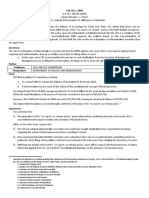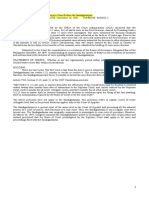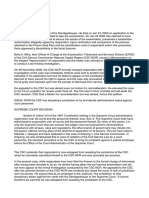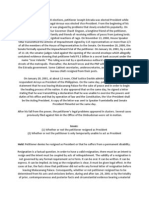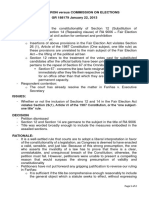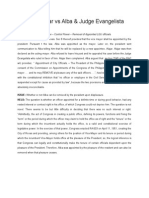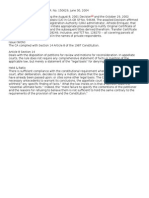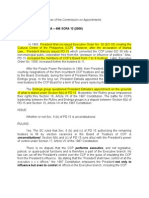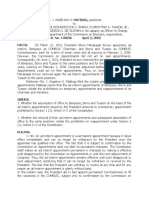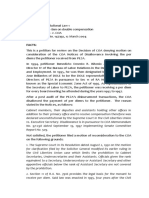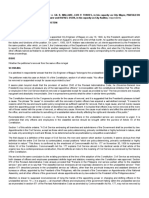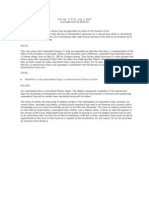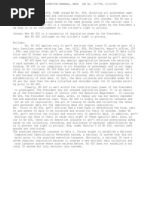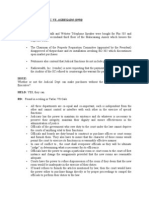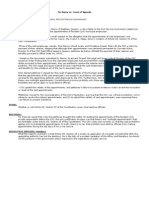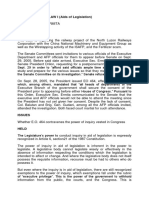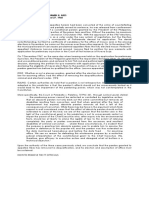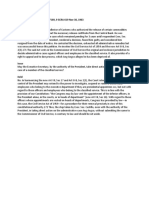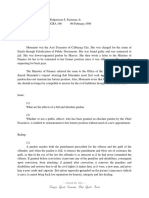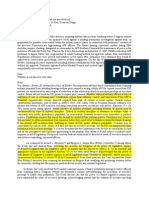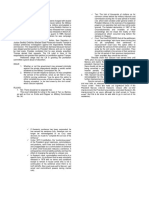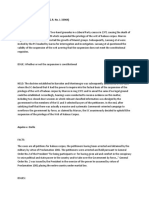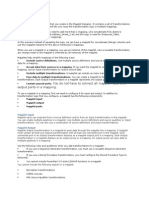(Poli) Drilon v. CA
(Poli) Drilon v. CA
Uploaded by
Maya Julieta Catacutan-EstabilloCopyright:
Available Formats
(Poli) Drilon v. CA
(Poli) Drilon v. CA
Uploaded by
Maya Julieta Catacutan-EstabilloOriginal Description:
Copyright
Available Formats
Share this document
Did you find this document useful?
Is this content inappropriate?
Copyright:
Available Formats
(Poli) Drilon v. CA
(Poli) Drilon v. CA
Uploaded by
Maya Julieta Catacutan-EstabilloCopyright:
Available Formats
DRILON V.
CA
G.R. No. 91626
October 3, 1991
FACTS:
The Department of Justice has brought suit to annul the CA decision prohibiting
the Government from pursuing criminal actions against the private respondents
for the death of Ireneo Longno and Lonely Chavez during early martial law.
In 1973, the private respondents PAREDES and GANZON were charged with
double murder before Military Commission No. 34. The military promulgated a
decision acquitting PAREDES but sentencing GANZON to life imprisonment with
hard labor. PAREDES was released from custody while GANZON was made to
serve sentence until he was released in 1978 and placed under house arrest
under guard. In 1985, GANZON joined the Kilusang Bagong Lipunan (KBL), the
party in power, where he was designated as campaign manager.
In 1988, administration having changed, then DOJ Sec. Ordoez directed State
Prosecutor Trampe to conduct a preliminary investigation against the private
respondents for the above murders. The private respondents moved for
dismissal, in GANZON'S case, on the ground that he, Ganzon, had been
extended an absolute pardon by the President Marcos, and he, having been
previously convicted, can no longer be tried anew, and in Paredes' case, on the
ground that he, Paredes, had been acquitted. Trampe, however, denied both
requests and reconsideration having been likewise denied, the private
respondents went to the Court of Appeals on prohibition.
The petitioners allege that the Court of Appeals, in granting prohibition,
committed a grave abuse of discretion:
(1)Ganzon has not adequately proved the fact of presidential pardon;
(2)there exists no evidence in the files of the Government to prove pardon;
(3)Ganzon's copy is a bare machine copy and Ganzon has failed to adequately
establish the loss of the original;
(4)the alleged pardon (or copy of it) had not been properly sealed and
authenticated, or executed in official Malacaang stationery; and
(5)the disposition of the murder cases by the military does not preclude the
filing of new informations by the civilian government.
ISSUES & HELD:
1. Whether or not the Government may proceed criminally against the
private respondents despite verdict earlier rendered by Military
Commission No. 34?
CANNOT PROCEED. Private respondents had been arraigned by the military
court, pleaded not guilty, and, with respect to Raul Paredes, acquitted, and with
respect to Ganzon, convicted and sentenced. To the mind of the Court, Ganzon
has accepted the judgment against him, and as Tan asked, "why should [he]
who has accepted the justness of the verdict of the military court who is
satisfied that he had a fair hearing, and who is willing to serve his sentence in
full, be dragged through the harrow of another hearing in a civil court to risk
being convicted a second time perchance to serve a heavier penalty?"
The falls squarely within Tan's ruling, and as we tolerated no reinvestigation
there, we can not tolerate one here.
The Court cited three cases:
a. Olaguer vs. Military Commission No. 34 Olaguer was rescued from a
court martial which sentenced him to death without receiving evidence in his
defense. It would be a cruel distortion of the Olaguer decision to use it as
authority for reprosecuting civilians regardless of whether, unlike Olaguer,
they had been accorded a fair trial and regardless of whether they have
already been acquitted and released, or have accepted sentences imposed
on them and commenced serving the same.
b. Tan vs. Barrios Olaguer should, in principle, be applied prospectively only
to future cases and cases still ongoing or not yet final when that decision
was promulgated. Hence, there should be no retroactive nullification of final
judgments, whether of conviction or acquittal, rendered by military courts
against civilians BEFORE the promulgation of the Olaguer decision. Such final
sentences should not be disturbed by the State. Only in particular cases
where the convicted person or the State shows that there was serious denial
of the Constitutional rights of the accused should the nullity of the sentence
be declared and a retrial be ordered based on the violation of the
constitutional rights of the accused, and not on the Olaguer doctrine. If a
retrial is no longer possible, accused should be released since the judgment
against him is null on account of the violation of his constitutional rights and
denial of process.
c. Cruz vs. Enrile all the petitioners in said proceedings "who have been
serving (but not yet completed) their sentence imprisonment" shall have "the
option either to complete the servic their sentence, or be tried anew by the
civil courts. Upon conviction they should be credited in the service of their
sentence for the period of their previous imprisonment. Upon acquittal, they
should be set free."
2. Whether or not Ganzon has completed the service of his sentence? YES.
Can Ganzon be reinvestigated? NO.
The Court can not consider Ganzon's house arrest as a continuation of his
sentence. First. because in no way is arrest a penalty, but rather a mere means
of "taking. . . a person into custody in order that he may be forthcoming to
answer for the commission of an offense," or, during early martial law, a means
to carry out Proclamation No. 1881, and second, because of the records' own
scant condition as the exact terms in his "house arrest" (which, parenthetically,
no longer exists.) Hence, the view of the Court is that irrespective of the
"pardon," Ganzon has served his sentence and to reiterate, he can no
longer be reinvestigated for the same offense, much more undergo
further imprisonment to complete his service.
You might also like
- CSC v. DBM DigestDocument3 pagesCSC v. DBM Digestkathrynmaydeveza100% (1)
- Gas Reservoirs6Document35 pagesGas Reservoirs6Veviet pomataNo ratings yet
- Pormento v. Estrada DigestDocument2 pagesPormento v. Estrada DigestJames Estrada Castro100% (1)
- Radiowealth Inc. V Agregado DigestDocument2 pagesRadiowealth Inc. V Agregado DigestAlthea M. Suerte100% (1)
- In Re Raul M. Gonzalez Case DigestDocument2 pagesIn Re Raul M. Gonzalez Case DigestJay-ar Rivera Badulis100% (2)
- People Vs GacottDocument2 pagesPeople Vs Gacottralph_atmosferaNo ratings yet
- 2012-398 Iloilo City Zoning Ordinance PDFDocument63 pages2012-398 Iloilo City Zoning Ordinance PDFMaya Julieta Catacutan-Estabillo100% (3)
- Mine Planning DesignDocument89 pagesMine Planning Designkhatonshughni86% (7)
- Drilon v. CA 1991Document1 pageDrilon v. CA 1991Thea BarteNo ratings yet
- People Vs Salle Case DigestDocument3 pagesPeople Vs Salle Case DigestCaroline Gonzales50% (2)
- 61 Re Problems of Delays in Cases Before The SandiganbayanDocument1 page61 Re Problems of Delays in Cases Before The SandiganbayanNMNGNo ratings yet
- CivPro D026 CSC Vs AndalDocument2 pagesCivPro D026 CSC Vs AndalERNIL L BAWANo ratings yet
- Gonzales Vs MacaraigDocument1 pageGonzales Vs MacaraigKaira Marie CarlosNo ratings yet
- Estrada v. Arroyo, G.R. No. 146738, March 2, 2001Document64 pagesEstrada v. Arroyo, G.R. No. 146738, March 2, 2001Reginald Dwight FloridoNo ratings yet
- Digest 01 - Giron V COMELEC - GR 188179 - Jan 22 2013Document2 pagesDigest 01 - Giron V COMELEC - GR 188179 - Jan 22 2013Kriska Herrero Tumamak100% (1)
- Doromal v. Sandiganbayan - 177 SCRA 354 (1989)Document2 pagesDoromal v. Sandiganbayan - 177 SCRA 354 (1989)André BragaNo ratings yet
- Vivencio Alajar Vs AlbaDocument1 pageVivencio Alajar Vs Albasunsetsailor85No ratings yet
- Tichangco V EnriquezDocument1 pageTichangco V EnriquezGayeGabriel100% (1)
- In Re GonzalesDocument1 pageIn Re GonzalesRon DecinNo ratings yet
- Rufino v. EndrigaDocument1 pageRufino v. EndrigaMadeliniaNo ratings yet
- Fortun v. Macapagal-ArroyoDocument2 pagesFortun v. Macapagal-ArroyoAntonJohnVincentFrias100% (4)
- Matibag Vs BenipayoDocument2 pagesMatibag Vs BenipayooliveNo ratings yet
- Sandoval V HretDocument5 pagesSandoval V HretSarah Jane UsopNo ratings yet
- Bitonio, Jr. Vs COA, G.R. No. 147392, March 12, 2004Document4 pagesBitonio, Jr. Vs COA, G.R. No. 147392, March 12, 2004Roward100% (1)
- Bermudez V TorresDocument3 pagesBermudez V TorresAndrea AlegreNo ratings yet
- 19 Dimayuga vs. BenedictoDocument2 pages19 Dimayuga vs. BenedictoNigel GarciaNo ratings yet
- Brillantes Vs ComelecDocument5 pagesBrillantes Vs ComelecCarlota Nicolas VillaromanNo ratings yet
- Arnault Vs Nazareno (G.R. No. L-3820, July 18, 1950) - Full TextDocument21 pagesArnault Vs Nazareno (G.R. No. L-3820, July 18, 1950) - Full TextkwikkwikNo ratings yet
- Torres V The DirectorDocument1 pageTorres V The DirectorMariaAyraCelinaBatacan100% (1)
- De Los Santos v. MallareDocument3 pagesDe Los Santos v. MallaredyosaNo ratings yet
- CSC v. SalasDocument4 pagesCSC v. SalasRoyen Lacson De MesaNo ratings yet
- ERIGUEL v. COMELEC, G.R. No. 190526 (February 26, 2010) EN BANC FactsDocument2 pagesERIGUEL v. COMELEC, G.R. No. 190526 (February 26, 2010) EN BANC FactsTin LicoNo ratings yet
- Rufino Vs EndrigaDocument2 pagesRufino Vs EndrigaDonna Faith ReyesNo ratings yet
- Philcomsat Vs SenateDocument1 pagePhilcomsat Vs SenateJebellePuracanNo ratings yet
- Consti Case Sixto S. Brillantes, JR., Et - Al vs. Comelec GR 163193, June 15, 2004 432 SCRA 269Document2 pagesConsti Case Sixto S. Brillantes, JR., Et - Al vs. Comelec GR 163193, June 15, 2004 432 SCRA 269Lu CasNo ratings yet
- Kilosbayan Vs ErmitaDocument1 pageKilosbayan Vs ErmitaSig G. MiNo ratings yet
- Go Tek Vs Deportation BoardDocument3 pagesGo Tek Vs Deportation Boardlovekimsohyun89No ratings yet
- Civil Liberties Union v. Executive Secretary, G.R. No. 83896, 22 FebruaryDocument4 pagesCivil Liberties Union v. Executive Secretary, G.R. No. 83896, 22 FebruaryGericah RodriguezNo ratings yet
- 20.1 People vs. Gacott DigestDocument1 page20.1 People vs. Gacott DigestEstel TabumfamaNo ratings yet
- H37. Llamas Vs Orbos 202 SCRA 844Document1 pageH37. Llamas Vs Orbos 202 SCRA 844ImmediateFalcoNo ratings yet
- 5 - Quintos-Deles v. Commission On Constitutional CommissionsDocument2 pages5 - Quintos-Deles v. Commission On Constitutional Commissionsada9ablaoNo ratings yet
- KILUSANG MAYO UNO vs. DIRECTOR-GENERAL, NEDA (GR No. 167798, 4/19/06)Document1 pageKILUSANG MAYO UNO vs. DIRECTOR-GENERAL, NEDA (GR No. 167798, 4/19/06)Enav Lucudda100% (1)
- I10 Radiowealth Inc vs. AgregadoDocument2 pagesI10 Radiowealth Inc vs. AgregadoSor ElleNo ratings yet
- De Rama Vs CADocument1 pageDe Rama Vs CARaymond RoqueNo ratings yet
- Jud Case DigestsDocument47 pagesJud Case DigestsJezen Esther PatiNo ratings yet
- CONSTITUTIONAL LAW I (Aids of Legislation) Case: Senate V Ermita FactsDocument2 pagesCONSTITUTIONAL LAW I (Aids of Legislation) Case: Senate V Ermita FactsJohn100% (1)
- Pimentel V. Joint Committee of Congress G.R. No. 163783, June 22, 2004 en Banc HeldDocument2 pagesPimentel V. Joint Committee of Congress G.R. No. 163783, June 22, 2004 en Banc HeldcyhaaangelaaaNo ratings yet
- Macalintal V Pet DigestDocument2 pagesMacalintal V Pet DigestCieloMarie100% (5)
- Villaluz V ZaldivarDocument1 pageVillaluz V ZaldivarAnonymous lokXJkc7l7No ratings yet
- General v. UrroDocument2 pagesGeneral v. UrroDLNo ratings yet
- Fortun vs. Macapagal-Arroyo Not JusticiableDocument19 pagesFortun vs. Macapagal-Arroyo Not JusticiableJP TolNo ratings yet
- Ople Vs TorresDocument4 pagesOple Vs TorresRmLyn MclnaoNo ratings yet
- 222 - Digest - de Los Santos V Mallare - G.R. No. L-3881 - 31 August 1950Document3 pages222 - Digest - de Los Santos V Mallare - G.R. No. L-3881 - 31 August 1950Christian Kenneth TapiaNo ratings yet
- AMBROCIO LACUNA V BENJAMIN ABESDocument1 pageAMBROCIO LACUNA V BENJAMIN ABESJoanna Grace LappayNo ratings yet
- Civil Service Commission v. SalasDocument2 pagesCivil Service Commission v. SalasRuby Reyes100% (3)
- Romulo v. Yniguez - Case DigestDocument3 pagesRomulo v. Yniguez - Case DigestGeanelleRicanorEsperonNo ratings yet
- Ang-Angco v. Castillo No. L-17169, 9 SCRA 619 Nov 30, 1963 FactsDocument1 pageAng-Angco v. Castillo No. L-17169, 9 SCRA 619 Nov 30, 1963 FactsLIERANo ratings yet
- Monsanto v. Factoran (1989) (Digest)Document2 pagesMonsanto v. Factoran (1989) (Digest)Alfred LacandulaNo ratings yet
- De Agbayani vs. Philippine National Bank, No. L-23127. April 29Document2 pagesDe Agbayani vs. Philippine National Bank, No. L-23127. April 29Ralph PanesNo ratings yet
- Bondoc Vs Pineda 201 SCRA 792Document10 pagesBondoc Vs Pineda 201 SCRA 792MykaNo ratings yet
- Gudani v. Senga, Case DigestDocument2 pagesGudani v. Senga, Case DigestChristian100% (2)
- Drilon V CaDocument2 pagesDrilon V CaJane Irish GaliciaNo ratings yet
- Executive DigestDocument6 pagesExecutive DigestJade TanggaanNo ratings yet
- BSP Circular 1098Document3 pagesBSP Circular 1098Maya Julieta Catacutan-EstabilloNo ratings yet
- BSP Circular 1104Document14 pagesBSP Circular 1104Maya Julieta Catacutan-EstabilloNo ratings yet
- BSP Circular 1111Document8 pagesBSP Circular 1111Maya Julieta Catacutan-EstabilloNo ratings yet
- BSP Circular 1109Document3 pagesBSP Circular 1109Maya Julieta Catacutan-EstabilloNo ratings yet
- BSP Circular 1106Document2 pagesBSP Circular 1106Maya Julieta Catacutan-EstabilloNo ratings yet
- BSP Circular 1107Document7 pagesBSP Circular 1107Maya Julieta Catacutan-EstabilloNo ratings yet
- BSP Circular 1101Document1 pageBSP Circular 1101Maya Julieta Catacutan-EstabilloNo ratings yet
- Ban Iko Pilipinas: SentralDocument3 pagesBan Iko Pilipinas: SentralMaya Julieta Catacutan-EstabilloNo ratings yet
- Sec Advisory Yellowdot Transport Terminal Inc.Document1 pageSec Advisory Yellowdot Transport Terminal Inc.Maya Julieta Catacutan-EstabilloNo ratings yet
- BSP Circular 1108Document9 pagesBSP Circular 1108Maya Julieta Catacutan-EstabilloNo ratings yet
- Senrnal: BanekoDocument4 pagesSenrnal: BanekoMaya Julieta Catacutan-EstabilloNo ratings yet
- BSP Revised Framework On Selection of External AuditorsDocument7 pagesBSP Revised Framework On Selection of External AuditorsMaya Julieta Catacutan-EstabilloNo ratings yet
- BSP c1041Document2 pagesBSP c1041Maya Julieta Catacutan-EstabilloNo ratings yet
- Sec OGC Opinion 2019-19Document3 pagesSec OGC Opinion 2019-19Maya Julieta Catacutan-EstabilloNo ratings yet
- Ronald John Lim vs. Conchita Carpio Morales in Her Capacity As Ombudsman, People of The Philippines and SandiganbayanDocument4 pagesRonald John Lim vs. Conchita Carpio Morales in Her Capacity As Ombudsman, People of The Philippines and SandiganbayanMaya Julieta Catacutan-EstabilloNo ratings yet
- RA-11232 Revised Corp CodeDocument53 pagesRA-11232 Revised Corp Codejoelsy10088% (8)
- C 1044Document28 pagesC 1044Maya Julieta Catacutan-EstabilloNo ratings yet
- Claim Child Benefit - GOV - UkDocument6 pagesClaim Child Benefit - GOV - UkMaya Julieta Catacutan-EstabilloNo ratings yet
- Sec Ogc Opinion 2019-18Document5 pagesSec Ogc Opinion 2019-18Maya Julieta Catacutan-EstabilloNo ratings yet
- Notice: Request For CommentsDocument10 pagesNotice: Request For CommentsMaya Julieta Catacutan-EstabilloNo ratings yet
- Victorio vs. CA (Oral Defamation)Document3 pagesVictorio vs. CA (Oral Defamation)Maya Julieta Catacutan-EstabilloNo ratings yet
- RR No. 6-2019 - IRR Estate Tax AmnestyDocument5 pagesRR No. 6-2019 - IRR Estate Tax AmnestyAlexander Julio ValeraNo ratings yet
- Memorandum No. M 2018 014Document2 pagesMemorandum No. M 2018 014Maya Julieta Catacutan-EstabilloNo ratings yet
- BSP Memorandum No. M 2018 017Document12 pagesBSP Memorandum No. M 2018 017Maya Julieta Catacutan-Estabillo100% (1)
- BSP Memorandum 2018-21Document8 pagesBSP Memorandum 2018-21Maya Julieta Catacutan-EstabilloNo ratings yet
- HDMF Circular 275 - Implementing Guidelines On Employer Registration Contribution and Remittance Under RA 9679Document5 pagesHDMF Circular 275 - Implementing Guidelines On Employer Registration Contribution and Remittance Under RA 9679Maya Julieta Catacutan-EstabilloNo ratings yet
- Implement MLOps Practices On AWSDocument61 pagesImplement MLOps Practices On AWSdtitoin10No ratings yet
- Human & Economic GeographyDocument186 pagesHuman & Economic GeographySachindev CheyancherriNo ratings yet
- GB 82 InstallationDocument14 pagesGB 82 InstallationAkbarmoradiNo ratings yet
- Sees (Ee, Mise, Esm &elst) Timetable Semester Two 2022-2023 Draft 2Document20 pagesSees (Ee, Mise, Esm &elst) Timetable Semester Two 2022-2023 Draft 2el diabloNo ratings yet
- Hospital HVACDocument80 pagesHospital HVACHadeer MohamedNo ratings yet
- The Digital Divide and Its Impact On Economic DevelopmentDocument2 pagesThe Digital Divide and Its Impact On Economic DevelopmentntanirudaNo ratings yet
- Clean Water ActDocument5 pagesClean Water ActJexie Ann Gumiran AggabaoNo ratings yet
- JD For B2S Hardware EngineerDocument2 pagesJD For B2S Hardware Engineeryash1149aroraNo ratings yet
- Hostel Application Form 240815Document3 pagesHostel Application Form 240815Ahmadhussain AhmadhussainNo ratings yet
- Labor Law Notes Labor Relations 2Document8 pagesLabor Law Notes Labor Relations 2jutesterNo ratings yet
- Frecon 110P: Spare Part ListDocument13 pagesFrecon 110P: Spare Part ListNuno Rodrigues50% (2)
- Ammonium+bicarbonate+o+food+grade 30061453 TDSDocument1 pageAmmonium+bicarbonate+o+food+grade 30061453 TDSAbanoub EbaidNo ratings yet
- WSO&WSP-Shortcuts Cheat SheetsDocument10 pagesWSO&WSP-Shortcuts Cheat SheetsibraNo ratings yet
- MIL Q4 Module 4Document27 pagesMIL Q4 Module 4jaspergum25No ratings yet
- Apple Computer, Inc.: Maintaining The Music Business While Introducing Iphone and Apple TVDocument8 pagesApple Computer, Inc.: Maintaining The Music Business While Introducing Iphone and Apple TVAkarshNo ratings yet
- Building Construction Drawing Set A pdf-BTCVC303Document1 pageBuilding Construction Drawing Set A pdf-BTCVC30314 Sanket BordeNo ratings yet
- Brayton CycleDocument12 pagesBrayton CycleVinoth KumarNo ratings yet
- CH - 02 7-5-11Document42 pagesCH - 02 7-5-11Myla GellicaNo ratings yet
- Solutions To Ch04Document14 pagesSolutions To Ch04hala elged100% (1)
- Software Quality Engineering BS (SE) - VI: Dr. Assad AbbasDocument26 pagesSoftware Quality Engineering BS (SE) - VI: Dr. Assad AbbasAssad AbbasNo ratings yet
- MappletsDocument8 pagesMappletsjunkgr8mail6092No ratings yet
- Data Sheet - Kodaki - 2.5kW6.0kWDocument2 pagesData Sheet - Kodaki - 2.5kW6.0kWmustang460No ratings yet
- Hydro Test Stations A) With Test Pressure of 500 KG/CM (G) B) With Test Pressure of 400 KG/CM (G)Document25 pagesHydro Test Stations A) With Test Pressure of 500 KG/CM (G) B) With Test Pressure of 400 KG/CM (G)muthuinchristNo ratings yet
- Concept Paper TemplateDocument2 pagesConcept Paper TemplatePaulNo ratings yet
- Lesson Plan: Title: Fraction ActionDocument6 pagesLesson Plan: Title: Fraction Actionapi-323952552No ratings yet
- Is-2121-I-1981Document19 pagesIs-2121-I-1981Rohan MudshingikarNo ratings yet
- Installing and Configuring WindowsDocument13 pagesInstalling and Configuring WindowsdjreggieprNo ratings yet
- ABAP Workbench: How To Bookmark The T-Codes in SAP Easy Access?Document13 pagesABAP Workbench: How To Bookmark The T-Codes in SAP Easy Access?bharath_sajjaNo ratings yet
